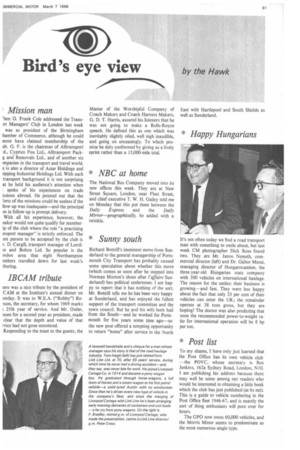Mission man
Page 63

If you've noticed an error in this article please click here to report it so we can fix it.
'hen G. Frank Cole addressed the Transrt Managers' Club in London last week was as president of the Birmingham hamber of Commerce, although he could most have claimed membership of the ub. G. F. is the chairman of AI!transport :d., Cyprien Fox Ltd., Alltransport Packg and Removals Ltd., and of another six impanies in the transport and travel world. e is also a director of Astar Holdings and lipping Industrial Holdings Ltd. With such transport background it is not surprising at he held his audience's attention when
spoke of his experiences on trade issions abroad. He pointed out that the -orts of the missions could be useless if the [low-up was inadequate—and the principal 'm in follow-up is prompt delivery.
With all his experience, however, the eaker would not quite qualify for memberip of the club where the rule "a practising tnsport manager" is strictly enforced. The est person to be accepted by the club is r. D. Cargill, transport manager of Lorriltx and Bolton Ltd. So popular is the indon area that eight Northampton !mbers travelled down for last week's thering.
M CAM tribute
tere was a nice tribute by the president of CAM at the Institute's annual dinner on onday. It was to W.E.A. ("Robby") Roison, the secretary, for whom 1969 marks
25th year of service. And Mr. Ostler, osen for a second year as president, made clear that the depth and value of that Nice had not gone unnoticed.
Responding to the toast to the guests, the Master of the Worshipful Company of Coach Makers and Coach Harness Makers, G. D. T. Harris, assured his listeners that he was not going to make a Rolls-Royce speech. He defined this as one which was inevitably slightly oiled, well nigh inaudible, and going on unceasingly. To which promise he duly conformed by giving us a lively sprint rather than a 15,000-mile trial.
* NBC at home
The National Bus Company moved into its new offices this week. They are at New Street Square, London, near Fleet Street, and chief executive T. W. H. Gailey told me on Monday that this put them between the Daily Express and the Daily Mirror—geographically, he added with a twinkle.
* Sunny south
Richard Bottrill's imminent move from Sunderland to the general managership of Portsmouth City Transport has probably caused some speculation about whether this move (which comes so soon after he stepped into Norman Morton's shoes after raffaire Sunderland) has political undertones. I am happy to report that it has nothing of the sort. Mr. Bottrill tells me he has been very happy at Sunderland, and has enjoyed the fullest support of the transport committee and the town council. But he and his wife both hail from the South—and he worked for Portsmouth for five years some time ago—so the new post offered a tempting opportunity to return "home" after service in the North
East with Hartlepool and South Shields as well as Sunderland.
It's not often today we find a road transport man with something to smile about, but last week CM photographer Dick Ross found two. They are Mr. Janos Nemeth, commercial director (left) and Dr. Gabor Mezei, managing director of Hungarocamion, the three-year-old Hungarian state company with 500 vehicles on international haulage. The reason for the smiles: their business is growing—and fast. They were less happy about the fact that only 25 per cent of their vehicles can enter the UK; the remainder operate at 38 tons gross, but they are hoping! The doctor was also predicting that soon the recommended power-to-weight ratio for international operation will be 8 hp per ton.
* Post list
To my shame, I have only just learned that the Post Office has its own vehicle club —the POVC, whose secretary is Ben Jenkins, 162a Sydney Road, London, N10. I am publishing his address because there may well be some among our readers who would be interested in obtaining a little book which the club has just published (at 6s net). This is a guide to vehicle numbering in the Post Office fleet 1946-67, and is exactly the sort of thing enthusiasts will pore over for hours.
The GPO now owns 60,000 vehicles, and the Morris Minor seems to predominate as the most numerous single type.












































































































































































